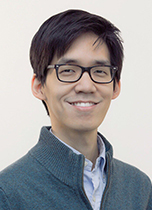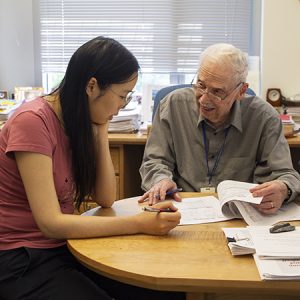Congratulations to the 512 students majoring in electrical and computer engineering or computer science who made the College of Engineering Dean’s List for winter term of 2020! These undergraduate and postbaccalaureate students achieved better than a 3.75 GPA with at least 12 credits.
Nikolas Achatz
Benjamin Adams
Victor Agostinelli III
Walter Agra Neto
Humza Ahmed
Francesco Aiello
Alhusam Sarhan Hilal Al Harthy
Abdulaziz Al-Mannai
Ibrahim Alarifi
Ryan Alder
Ali Mohamed Abdulrahman Sheikh Alhabshi
Matthew Alonso
Nawaf Alothman
Benjamin Alvi
Jacob Anderson
Hannah Armstrong
Theodora Arnold
Kevin Atkins
Aaron Au
Stephanie Babb
Aditya Bagchi
Xiaoqin Bai
Ian Bailey
Spencer Bain
Dakota Baird
Alexander Baird-Appleton
Aeijan Bajracharya
Wesley Bakane
Jack Barnes
Nicolas Barraclough
Joshua Barringer
Samuel Barton
Kyle Barton
Aylish Bateman
Jordan Baxter
Ryan Bay
Jared Beale
Aidan Beery
John Behman
Bolivar Beleno Santos
Rebecca Bell
Kenton Bender
Sebastian Benjamin
Connor Bentzley
Braam Beresford
Justin Bethel
Tyler Betley
Nicholas Biggerstaff
Anthony Bishop
Zachary Bishop
Jackson Bizjak
Megan Black
Peter Bloch
Roman Bober
Reed Boeshans
Carl Bohme
Francisco Bolanos
Michael Boly
Lauren Boone
Sean Booth
Piers Borngasser
Miklos Bowling
Samuel Brimhall
Nicholas Broce
Ian Brown
Brayden Brown
Felix Brucker
Sawyer Brundage
Kiet Song Bui
Timothy Bui
Peri Cabrales
Claire Cahill
Sonia Camacho
John Pierre Carr
Milton Carreno Rodriguez
Brian Cebra
Blake Cecil
Lilian Chan
Michael Chan
David Chan
Jason Chen
Yuhang Chen
Min Chew
Hae Won Cho
Sanchit Chopra
Brian Christensen
Hunter Christiansen
Malachi Christman
Kendrick Chu
Adam Clayman
Evan Cochran
Tyler Cole
Michael Commins
Beniamin Condrea
Adam Conrad
Joshua Cook
David Coons
Kira Corbett
Devon Crane
Amanda Crawford
Gabriel Crew
Thomas Croll
Brian Cross
Rebecca Croysdale
Nathan Crozier
Ryan Cryar
Ziqi Cui
Jackson Cutler
Zeyu Dai
William Dam
William Dang
Dominic Daprano
John Davis
Hudson Dean
Mark Deane
Wyatt Deck
Hao Deng
Abbi Devins-Suresh
Madison Dhanens
Austin Dibble
Joseph Didner
Chetan Dindukurthi
Heather DiRuscio
Kristen Dolan
Samuel Dorning
Miles Drake
Jonathan Dressel
Dylan Drudge
Liang Du
Dafei Du
Alexander Dunn
Sarah Eastwood
Victoria Ebert
Christopher Eckerson
Dirar El Hadar
Rasheed El Kassed
Mohamed Eldebri
Mark Ellarma
Robert Elsom
Jacob Engstrom
Martin Escoto
Kyle Esquerra
Alyssa Estenson
Maxwell Evdemon
Michael Fagan
Shannon Farazi
Anousha Farshid
Danila Fedorin
Kyle Felix
Matthew Ferchland
Christopher Feth
Anthony Filippello
Julian Fortune
Neal Fredrick
Duncan Freeman
Sierra Freihoefer
Johannes Freischuetz
Caden Friesen
Michael Fuller
Calvin Gagliano
Aaron Galati
Kate Galle
Lyubomir Gankov
Jared Gaskin
David Gasper
Tristan Gavin
Kai Gay
Andrew Gehrke
Sean Gillen
Timothy Glew
Yesh Godse
Austin Goergen
Jackson Golletz
Bradley Gore
Sergiy Greblov
Benjamin Green
Connor Greenwald
Alex Grejuc
Taylor Griffin
Isaac Grossberg
Shengjun Gu
Matthew Guo
Gavin Gutowsky
Melanie Gutzmann
Alexander Guyer
Grant Haines
Adam Hamilton-Sutherland
Geoffry Hammon
Quinn Handley
Lucas Hanssen
Donald Harkins
Keaton Hartman
Nathan Hausman
David Headrick
Elise Hebert
Claire Hekkala
Kyle Hiebel
Aleksi Hieta
Arthur Hiew
Benjamin Hillen
Ethan Hirsch
Eric Hoang
Jaiden Hodson
Tyler Holeman
Monica Holliday
Evan Hopper-Moore
Zachary Horine
Caulin Horowitz
Christien Hotchkiss
Bart Hough
Wei-Chien Hsu
Catherine Hu
Andy Hua
Zijing Huang
Michael Huang
Jianlong Huang
Casey Huggins
Megan Hurley
Mark Huynh
Kevin Hwang
Gaetan Ingrassia
Matthew Jacobsen
Kyler Jacobson
Brieanna Jeibmann
Fischer Jemison
Manda Jensen
Junhyeok Jeong
Nathaniel Jewell
Helen Jiang
Laura Jiang
Nicholas Johansen
Lukas Johnson
Ethan Jones
Cameron Jones
Donald Joyce
Sowmya Jujjuri
Nelson Mwangi Kangethe
Kyle Kanwischer
John Kaufman
Zavi Kaul
Matthew Kerr
Nicholas Kiddle
Trenton Kilgore
Jinwon Kim
Brian Kim
Kwanghyuk Kim
Atsuhito Kita
Cameron Kocher
Matthew Koenig
Amber Kolar
Noah Koontz
Andrey Kornilovich
Nicholas Kosa
Aditya Dilip Kothari
Chase Kozol
Rajat Kulkarni
Violet Kurtz
Lindsey Kvarfordt
Jacob Lagmay
Brandon Lam
Joseph Landreville
Kevin Le
Dustin Lear
Yevgeniy Lebid
Youngjoo Lee
Benjamin Lee
Juichi Lee
Joe Lei
Oscar Lemus
Samuel Leonard
Grayson Lewis
Samuel Lewis
Yue Li
Jia Yi Li
Wence Li
Feng Liang
Megan Liles
Xinwei Lin
Virginia Link
Ryan Little
Jaelyn Litzinger
Suyang Liu
Haolin Liu
Zhihui Liu
Susan Liu
Nathan Liu
Alexis Lopez
Jose Lopez Alcala
Simon Louie
Grayland Lunn
Kenny Luong
Tristan Luther
Phi Luu
Stanislav Lyakhov
Jiaheng Lyu
Xinyu Ma
Melvin Ma
Jonathan Macias
Matthew Macovsky
Seika Mahmud
Theresa Mai
Cameron Markwell
Isaac Marquez
Jordyn Marshall
Benjamin Martin
Anthony Martin
Mary May
Shawn Mc Mannis
Cody McCall
Patrick McGrath
Danielle McIntosh
Patrick McKillop-Bay
Daniel Mesa
Nicholas Milford
Leif Miller
Harry Miller
Aedan Mills
Brogan Miner
Luke Mitchell-Nelson
Jasmine Mittal
Jiawei Mo
Grayson Molesworth
Alex Molisani
Anna Mollere
Alexander Molotkov
Santiago Monleon
Samson Mont
Danyelle Montalvo
Stephen More
Michael Morelli
Pablo Moreno
Kevin Moy
Joshua Muir
Hamza Munaf
Trevor Murphy
Colin Murphy
Alexander Nead-Work
Kevin Neiger
Aiden Nelson
Evan Newman
Ethan Ng
Don Nguyen
Triet Nguyen
Anthony Nguyen
Bao Nguyen
Minh Nguyen
Khanh Nguyen
Coulby Nguyen
An-phong Nguyen
Hoang Nguyen
Nancy Nguyen
Thuy-Vy Nguyen
Jonathan Nguyen
Quan Nguyen
Pham Phuoc Loc Nguyen
Corey Nielsen
Jacob Niphanprasart
Kyle Noble
Josie O’Harrow
Timothy O’Rourke
Stephen Oh
Sae Hyoung Oh
Jaegeun Oh
Carter Olsen
Payton Olson
Nicholas Olson
Breanne Oo
Rachel Orrell
Felipe Orrico Scognamiglio
Drew Ortega
Steven Owens
Alexa Pack
Ajay Pallekonda
Justin Parks
Zachary Parsons
Christopher Patenaude
Ethan Patterson
Joshua Pauls
Michael Payne
Kawin Pechetratanapanit
Zack Pelster
Jessica Peterson
Preston Pickering
Trinity Polk
Thomas Prihoda
Ashyan Rahavi
Ridwana Rahman
Jose Ramos
Lyell Read
Mateo Rey-Rosa
Kyle Rosenau
Ekaterina Rott
Emmanuel Rovirosa
Chalida Ruangrotsakun
Nikita Rubocki
Matthew Ruder
Daniel Safarov
Sachin Sakthivel
Ricky Salinas
Micah Samaduroff
Gregory Sanchez
McIntyre Santa Cruz
Andrew Sauer
Bailey Sauter
Zakiah Schaefle
Shifra Schectman
Mitchell Schenk
Jason Scott-Hakanson
Nathan Seabourn
Jett Seale
Richard Seals
Karen Setiawan
Noah Seumalo
Nathan Shaaban
Jordan Sheller
Joshua Shequin
NianJun Shi
Isaac Shih
Patrick Shuler
Elijah Shumway
Zhaowei Si
Jonah Siekmann
Pranav Simha
Roy Simons
Harshvardhan Singh
Andy Situ
Allison Skinner
Richard Smith
Madelyn Smith
Thomas Snyder
Sebastian Sojka
Cruz Solano-Nieblas
Nathan Stageberg
Jason Stallkamp
Avery Stauber
Benjamin Steele
Zachary Steinberg
Matthew Sterrett
Keith Stevens
Shanti Stewart
Yuhao Su
Clayton Surgeon
Cole Swanson
Marjorie Symonds
Blaise Takushi
Wei Tang
Pavan Thakkar
Zachary Thomas
Tristan Thompson
Thomas Tonini
Logan Traffas
Khoa Tran
Shayla Tran
Brayden Tremper
Andy Trinh
Anthony Trinh
James Trotter
Leif Tsang
Alexis Tucker
Jeremy Udarbe
Alexander Uong
Rohan Varma
Aaron Vaughan
Hannah Vaughan
Andres Vega
Aishwarya Vellanki
Jeffrey Visosky
Chinmay Wadgaonkar
Aaron Walder
Kyle Walker
Benjiman Walsh
Alexander Wan
Huahua Wang
Shiyao Wang
Faaiq Waqar
Benjamin Warschauer
Philip Warton
Christopher Weiner
Nicholas Weinert
Chung Weng
Joshua Wentzel
Natashia White
Austin Wilmoth
Calder Wilson
Blair Wilson
Odyssey Wilson
Andrew Wilson
Justin Womack
Jason Wong
Bradford Wong
Jackson Wright
Cheng Xie
Yuechen Xu
Qi Xu
Tianbao Yan
Jiayun Yan
James Yang
Xiaoyan Yang
Orel Yehuda
Eugene Jie Yee Yong
Arthur York
Logan York
Sam Young
Alex Young
Jason Yue
Ulises Zaragoza
Samantha Zeigler
Haoxuan Zhang
Dianxiong Zhang
Zisong Zhang
Jiaming Zhu
John Zontos









